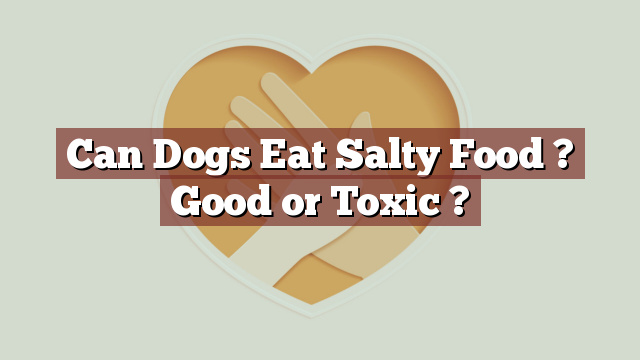Can Dogs Eat Salty Food? Good or Toxic?
It is crucial for pet owners to be aware of the foods that are safe for their furry friends to consume. While certain human foods can be shared with dogs, others can be harmful or even toxic to their health. One common question that often arises is whether dogs can eat salty food. In this article, we will explore the nutritional value of a balanced diet for dogs, examine the safety of salty food for our four-legged companions, discuss potential risks or benefits, and provide guidance on what to do if your dog accidentally consumes salty food.
Nutritional Value: Understanding the Importance of a Balanced Diet for Dogs
Maintaining a balanced diet is vital for the overall health and well-being of dogs. Just like humans, dogs require a variety of essential nutrients to thrive. These nutrients include proteins, carbohydrates, fats, vitamins, and minerals. A properly balanced diet ensures that dogs receive the necessary nutrients to support their growth, maintain healthy body weight, and strengthen their immune system. It is important to consult with a veterinarian to determine the appropriate diet for your dog based on their age, breed, size, and any specific health concerns.
Is Salty Food Safe or Toxic for Dogs? Expert Insights and Guidelines
Salty food is not safe for dogs and can be toxic to their health. While small amounts of salt are necessary for dogs, excessive consumption can lead to sodium ion poisoning. Dogs are more sensitive to salt than humans, and their bodies are not designed to handle high levels of sodium. Consuming salty food can cause a range of health issues for dogs, including dehydration, increased thirst, vomiting, diarrhea, excessive urination, and in severe cases, even seizures or organ failure.
Veterinarians strongly advise against feeding dogs salty food, such as salty snacks, processed foods, or foods seasoned with excessive amounts of salt. It is essential to read ingredient labels and avoid giving your dog any food that contains high levels of sodium.
Potential Risks or Benefits: How Salt Affects Dogs’ Health and Well-being
Salt, when consumed in moderation, plays a vital role in maintaining the balance of fluids in a dog’s body. It aids in proper nerve and muscle function and helps with the absorption of certain nutrients. However, excessive intake of salt can disrupt this balance and lead to various health problems.
Regularly consuming salty food can result in high blood pressure in dogs, which can strain the cardiovascular system and potentially lead to heart disease. Additionally, excessive sodium intake can cause the body to retain water, leading to edema and putting additional stress on the kidneys.
It is worth noting that certain medical conditions, such as kidney disease or heart problems, can make dogs more susceptible to the negative effects of salt. Therefore, it is crucial to adhere to a low-sodium diet if your dog has any underlying health issues.
My Dog Ate Salty Food! What Should I Do? Steps to Take and When to Seek Help
If your dog has accidentally consumed salty food, it is important to take immediate action. Contacting your veterinarian is crucial, as they can provide guidance tailored to your dog’s specific needs. In the meantime, you can help mitigate potential health risks by providing your dog with plenty of fresh water to prevent dehydration. Monitor your dog closely for any signs of distress or illness, such as excessive thirst, vomiting, diarrhea, or unusual behavior. Be prepared to provide your veterinarian with details about the type and amount of salty food your dog consumed.
Conclusion: Promoting a Healthy Diet and Responsible Feeding Habits for Dogs
In conclusion, it is important to understand that dogs should not consume salty food. While small amounts of salt are necessary for their health, excessive intake can be harmful and even toxic. Maintaining a balanced diet and responsible feeding habits are vital for promoting the well-being of our canine companions. Consult with your veterinarian to develop a suitable diet plan for your dog, ensuring they receive all the necessary nutrients without compromising their health. By being mindful of the foods we offer our dogs, we can help them lead long, healthy, and happy lives.
Thank you for investing your time in exploring [page_title] on Can-Eat.org. Our goal is to provide readers like you with thorough and reliable information about various dietary topics. Each article, including [page_title], stems from diligent research and a passion for understanding the nuances of our food choices. We believe that knowledge is a vital step towards making informed and healthy decisions. However, while "[page_title]" sheds light on its specific topic, it's crucial to remember that everyone's body reacts differently to foods and dietary changes. What might be beneficial for one person could have different effects on another. Before you consider integrating suggestions or insights from "[page_title]" into your diet, it's always wise to consult with a nutritionist or healthcare professional. Their specialized knowledge ensures that you're making choices best suited to your individual health needs. As you navigate [page_title], be mindful of potential allergies, intolerances, or unique dietary requirements you may have. No singular article can capture the vast diversity of human health, and individualized guidance is invaluable. The content provided in [page_title] serves as a general guide. It is not, by any means, a substitute for personalized medical or nutritional advice. Your health should always be the top priority, and professional guidance is the best path forward. In your journey towards a balanced and nutritious lifestyle, we hope that [page_title] serves as a helpful stepping stone. Remember, informed decisions lead to healthier outcomes. Thank you for trusting Can-Eat.org. Continue exploring, learning, and prioritizing your health. Cheers to a well-informed and healthier future!

